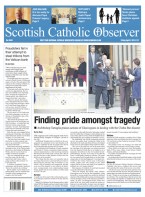BY Ian Dunn | January 16 | ![]() 2 COMMENTS
2 COMMENTS ![]() print
print

Vatican alarmed by religious freedom rulings in Europe
Archbishop Dominique Mamberti, secretary for the Holy See’s Relations with States, said recent European Court on Human Right’s decisions present a danger to religious freedom
A top Vatican official says the European Court on Human Rights’ latest rulings on religious freedom ‘call into question the Church’s freedom to function according to her own rules.’
Yesterday the European Court of Human Rights published its judgments on four cases relating to the freedom of conscience and religion of employees in the United Kingdom. A British Airways worker who was forced out of her job for wearing a cross had her religious rights violated the court ruled but they rejected similar claims made by three other Christians, including a challenge brought by nurse Shirley Chaplin, 57, who was switched to a desk job after she refused to take off a Crucifix which hung round her neck. Another two cases, those of marriage counsellor Gary McFarlane, 51, and registrar Lillian Ladele, 52 who objected to elements of their jobs that they felt conflicted with their beliefs, were also dismissed.
Archbishop Dominique Mamberti (above), secretary for the Holy See’s Relations with States, said the cases set a worrying precedent during an interview with Vatican Radio.
“These cases call into question the Church’s freedom to function according to her own rules and not to be subject to civil rules other than those necessary to ensure that the common good and just public order are respected,” he said. “The Church has always had to defend herself in order to preserve her autonomy with regard to the civil power and ideologies. Today, an important issue in Western countries is to determine how the dominant culture, strongly marked by materialist individualism and relativism, can understand and respect the nature of the Church, which is a community founded on faith and reason.”
The archbishop went on say the Vatican was seeking to ensure the necessity of religious freedom was recognised across Europe.
“In this context, the Holy See draws attention to the necessity of maintaining religious freedom in its collective and social dimension,” he said. “This dimension corresponds to the essentially social nature both of the person and of the religious fact in general. The Church does not ask that religious communities be lawless zones but that they be recognised as spaces for freedom, by virtue of the right to religious freedom, while respecting just public order. This teaching is not reserved to the Catholic Church; the criteria derived from it are founded in justice and are therefore of general application.”












The Vatican should relax; the Editor of the London Tablet does not seem worried.
That speaks volumes in itself.